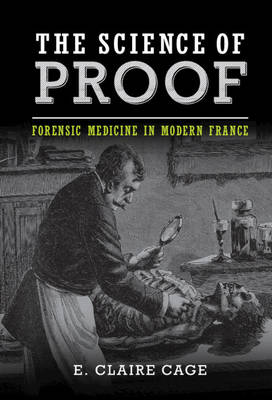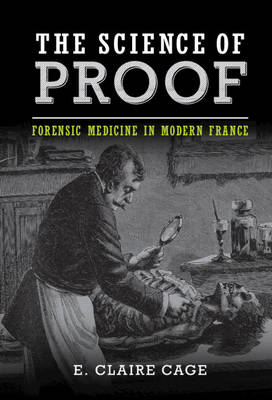
Bedankt voor het vertrouwen het afgelopen jaar! Om jou te bedanken bieden we GRATIS verzending (in België) aan op alles gedurende de hele maand januari.
- Afhalen na 1 uur in een winkel met voorraad
- In januari gratis thuislevering in België
- Ruim aanbod met 7 miljoen producten
Bedankt voor het vertrouwen het afgelopen jaar! Om jou te bedanken bieden we GRATIS verzending (in België) aan op alles gedurende de hele maand januari.
- Afhalen na 1 uur in een winkel met voorraad
- In januari gratis thuislevering in België
- Ruim aanbod met 7 miljoen producten
Zoeken
Omschrijving
The Science of Proof traces the rise of forensic medicine in late eighteenth- and nineteenth-century France and examines its implications for our understanding of expert authority. Tying real life cases to broader debates, the book analyzes how new forms of medical and scientific knowledge, many of which were pioneered in France, were contested, but ultimately accepted, and applied to legal problems and the administration of justice. The growing authority of medical experts in the French legal arena was nonetheless subject to sharp criticism and scepticism. The professional development of medicolegal expertise and its influence in criminal courts sparked debates about the extent to which it could reveal truth, furnish legal proof, and serve justice. Drawing on a wide base of archival and printed sources, Claire Cage reveals tensions between uncertainty about the reliability of forensic evidence and a new confidence in the power of scientific inquiry to establish guilt, innocence, and legal responsibility.
Specificaties
Betrokkenen
- Auteur(s):
- Uitgeverij:
Inhoud
- Aantal bladzijden:
- 276
- Taal:
- Engels
- Reeks:
Eigenschappen
- Productcode (EAN):
- 9781009198332
- Verschijningsdatum:
- 1/09/2022
- Uitvoering:
- Hardcover
- Formaat:
- Genaaid
- Afmetingen:
- 152 mm x 229 mm
- Gewicht:
- 576 g

Alleen bij Standaard Boekhandel
+ 337 punten op je klantenkaart van Standaard Boekhandel
Beoordelingen
We publiceren alleen reviews die voldoen aan de voorwaarden voor reviews. Bekijk onze voorwaarden voor reviews.









